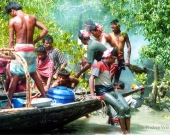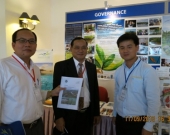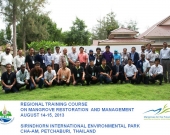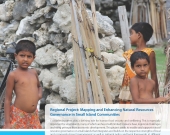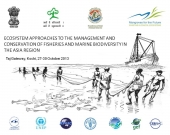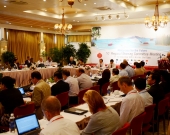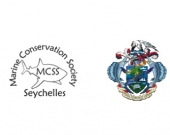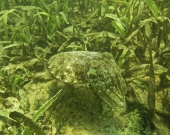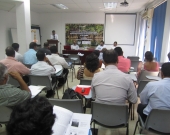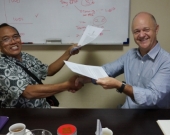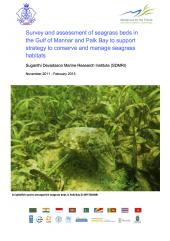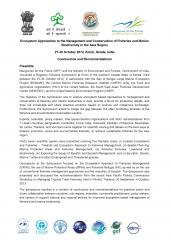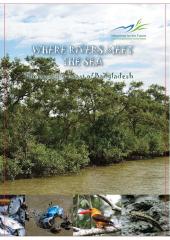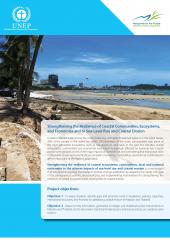Newsroom :: Newsletter :: MFF Newsletter 30
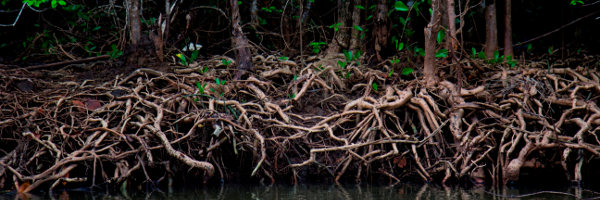
|
Mangroves for the Future Newsletter - Issue 30
1st Aug 2013 - 18th Dec 2013
In the last edition of the newsletter, we introduced the MFF resilience approach, which explores the dynamics and interactions between social and ecological systems in coastal areas, as a way to build resilience of coastal communities. MFF's resilience approach is being piloted in Bangladesh, Indonesia and Viet Nam that are all focusing on mangroves and climate change impacts in coastal areas. In this edition, we explore the expansion of the approach beyond these three countries.
Resilience is not a new concept. Over the past decade, resilience theory has evolved as a way to characterize the ability of social and ecological systems to prepare for change and to recover and renew themselves. Whereas the resilience concept is widely used in the disaster risk management context, the MFF approach to resilience goes beyond that and aims at integrating the resilience perspective in all planning and interventions for sustainable development of the ecosystem dependent coastal communities.
Many aspects of the resilience approach are already resident in the work that MFF has been supporting over the years, but the work has now evolved to include a consistent approach and development of an evaluation framework to guide the strategic delivery of MFF grants. Most recently, MFF organized a “Training of Trainers” workshop in Karachi, Pakistan where a case study from Shyamnagar in Bangladesh was used to illustrate how the Resilience Analysis Platform tool can be contextualized and applied to analyse potential MFF project sites in other countries.
In the recently concluded 10th Regional Steering Committee meeting, graciously hosted by the Government of Viet Nam, MFF presented the MFF Resilience Approach more fully to its members. On its endorsement as a new member country, Cambodia announced that building community resilience is one of its top national priorities.
MFF's resilience approach is also being applied to a number of regional and national activities, and integrated into projects that you can read about in this issue of the newsletter – from biodiversity conservation efforts in India, Seychelles and Sri Lanka to a regional project being implemented by Pakistan and Thailand .
The newsletter also reports on two regional learning events organized by MFF and its partners. One is the MFF Regional Mangrove Training Course held in Cha-am, Thailand , and the other is the MFF Regional Fisheries Symposium held in Kerala, India. At the mangrove training course, participants learned about effective community-based methods for planning, implementing, and monitoring mangrove restoration and management activities.The MFF Regional Fisheries Symposium, that was organized in partnership with BOBLME, FAO, UNEP, SEAFDEC and the Government of India resulted in Conclusion and Recommendations for sustainable management of fisheries and coastal habitats that can be used to guide the planning of countries for national and regional interventions.
As 2013 comes to a close, MFF looks forward to a new year of activities and regional partnerships, and to your continued support in building a healthier, more prosperous and secure future for all coastal communities.
Visit our website www.mangrovesforthefuture.org and our Facebook page to find out more, and spread the good word!
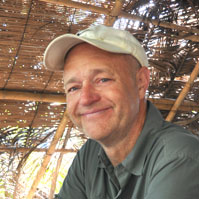
Steen Christensen
Coordinator
Mangroves For The Future
MFF online survey
Please take a short online survey to help make the MFF newsletter better: Take Survey
Regional Activities
MFF’s resilience approach goes mainstream
Asia Region 12 Dec 2013
Recognizing that many coastal communities are critically dependant on well functioning ecosystems and their services (e.g. mangroves or coral reefs) MFF has since 2012 developed a resilience framework to guide its support and interventions in the member countries.
The framework provides a tool, the MFF Resilience Analysis Platform (RAP) for structured analysis of the target communities taking into consideration both the social and ecological system. By using the RAP tool it is possible to get a detailed understanding of the gaps in resilience in the two systems which needs to be addressed. This 'resilience map' will allow MFF to provide a more strategic support and in addition will provide the countries with valuable information for development of their national coastal development policies.
MFF welcomes Cambodia as 10th member country
Hoi An, Viet Nam 13 Sep 2013
The Regional Steering Committee (RSC -10) meeting held in Hoi An, Viet Nam from 11-14 September 2013 endorsed the membership of Cambodia as the 10th MFF country. The nine MFF member countries, institutional partners FAO, IUCN, UNDP, UNEP, Wetlands International, and donors endorsed and welcomed Cambodia's membership. As per the RSC 10 decisions, Cambodia's membership will take effect beginning MFF Phase 3.
MFF trains regional coastal managers on mangrove restoration and management
Petchaburi, Thailand 14 Aug 2013
MFF, together with the Sirindhorn International Environmental Park - Thailand, conducted a Regional Training Course on Mangrove Restoration and Management from 13-21 August. Coastal managers from MFF countries received technical training on restoration and management of mangrove ecosystems.
Coastal erosion, small islands, and responsible diving on regional MFF spotlight
Bangkok, Thailand 24 Oct 2013
Regional Grant Facility projects being implemented by MFF institutional partner United Nations Environment Programme (UNEP) to produce a new set of information material to shed more light about ecosystem-based approaches related to small islands governance, coastal erosion, and responsible diving.
Regional symposium puts spotlight on the need to protect marine biodiversity and Asia’s coastal fisheries
Kochi, India 28 Oct 2013
Representatives from more than 12 countries attended a Regional Fisheries Symposium from October 28 to 30 in Kochi, India with the goal of exploring ecosystem-based approaches to protecting fisheries and marine biodiversity in South and Southeast Asia, and to share practical science-based solutions to fisheries issues.
Protecting Asia’s Coasts for People and Nature : Viet Nam hosts 10th MFF regional meeting with focus on building community resilience
Hoi An, Viet Nam 11 Sep 2013
The 10th Regional Steering Committee of the Mangroves for the Future (MFF) initiative was held in Hoi An, Da Nang province, with representatives from the nine member countries convening to discuss efforts to protect coastal regions for people and for nature. This is the first time Viet Nam has hosted the meeting since becoming an MFF member country in 2010.
Country Updates
Sea Turtles celebrated in Seychelles Festival
Beau Vallon, Island of Mahe, Seychelles 09 Aug 2013
The Global Vision International (GVI) and the Marine Conservation Society of Seychelles (MCSS) along with some local NGO and Government Ministry partners organized a ‘Seychelles Sea Turtle Festival’ on August 9-10, 2013. The Seychelles marine sea turtles are critically endangered and the aim of the ‘Seychelles Sea Turtle Festival’ is to celebrate the Seychelles turtle population while simultaneously raising awareness of conservation issues.
Saving our speckled giants
West coast of India 16 Sep 2013
The largest fish in the world, whale sharks, have faced population declines globally. In Gujarat, India, they were once killed in large numbers, fetching up to USD 2,250 for fishermen. This was curbed in May 2001 when the species was afforded the highest level of protection under Schedule I of the Indian Wildlife (Protection) Act, 1972
Supporting a sanctuary for seagrasses in the Gulf of Mannar and Palk Bay.
Gulf of Mannar and Palk Bay, Tamil Nadu, India 16 Sep 2013
Seagrasses are amongst the least understood marine ecosystems in India. Despite being classified as ecologically sensitive regions and protected under the Coastal Regulation Zone Act, they have been largely left out of education, research, and management consideration, as compared with other ecologically sensitive habitats as mangroves and coral reefs.
Sri Lanka Divisional Forest Officers enhance knowledge on protected mangrove declaration process
Colombo, Sri Lanka 24 Sep 2013
Funded by MFF, 11 Divisional Forest Officers in Sri Lanka underwent training in mangrove declaration and mapping process.
MFF and Wetlands International renew Indonesia programme
Jakarta, Indonesia 31 Oct 2013
Mangroves for the Future, with the National Coordinating Body of Indonesia, witnessed the signing of a new agreement with Wetlands International (WI) - Indonesia Programme that kicks off new small grant facility projects in the country.
Recent MFF Resources
Survey and assessment of seagrass beds in the Gulf of Mannar and Palk Bay to support strategy to conserve and manage seagrass habitats
Publication Date: 06 Aug 2013
Author: SDMRI/MFF India
Download the full report »Ecosystem Approaches to Management and Conservation of Fisheries and Marine Biodiversity in the Asia Region
Conclusions and Recommendations
Publication Date: 02 Dec 2013
Author: MFF, UNEP, FAO APFIC, BOBLME GEF, SEAFDEC, CMFRI, MoE-Government of India
The symposium resulted in a number of conclusions and recommendations for practical action and future collaboration between countries, sub-regions, scientists, community practitioners, policy makers, and sectors to support national and regional policies for improved ecosystem based management of fisheries and marine biodiversity.
Download the full report »Where Rivers Meet the Sea
The Amazing Coast of Bangladesh
Publication Date: 08 Sep 2013
Author: Remeen Firoz
From Sundarbans- largest mangrove forest in the world to Cox's Bazaar- the longest unbroken sea beach and Saint Martin's Island- the meeting point of South Asia and South East Asia, the coastline of Bangladesh boasts some of the most unique and significant features. The book presents some interesting facts on Bangladesh's coasts.
Download the full report »Strengthening the resilience of coastal communities, ecosystems, and economies to Sea Level Rise and Coastal Erosion
Publication Date: 24 Oct 2013
Author: UNEP
Download the full report »